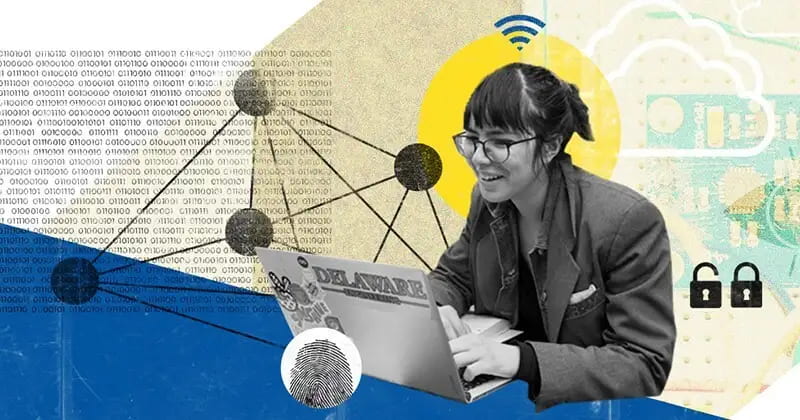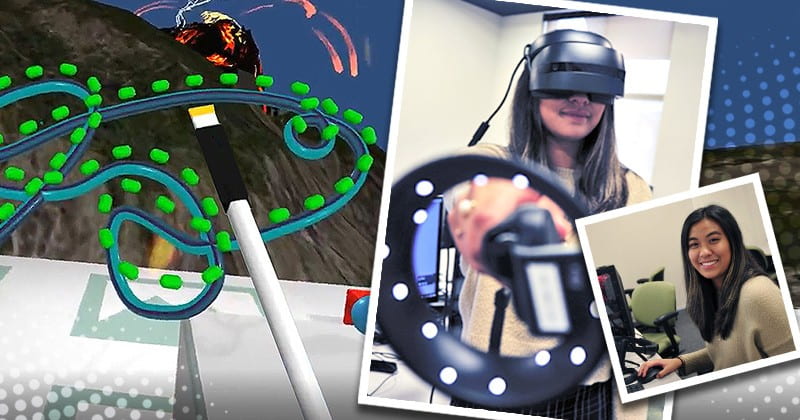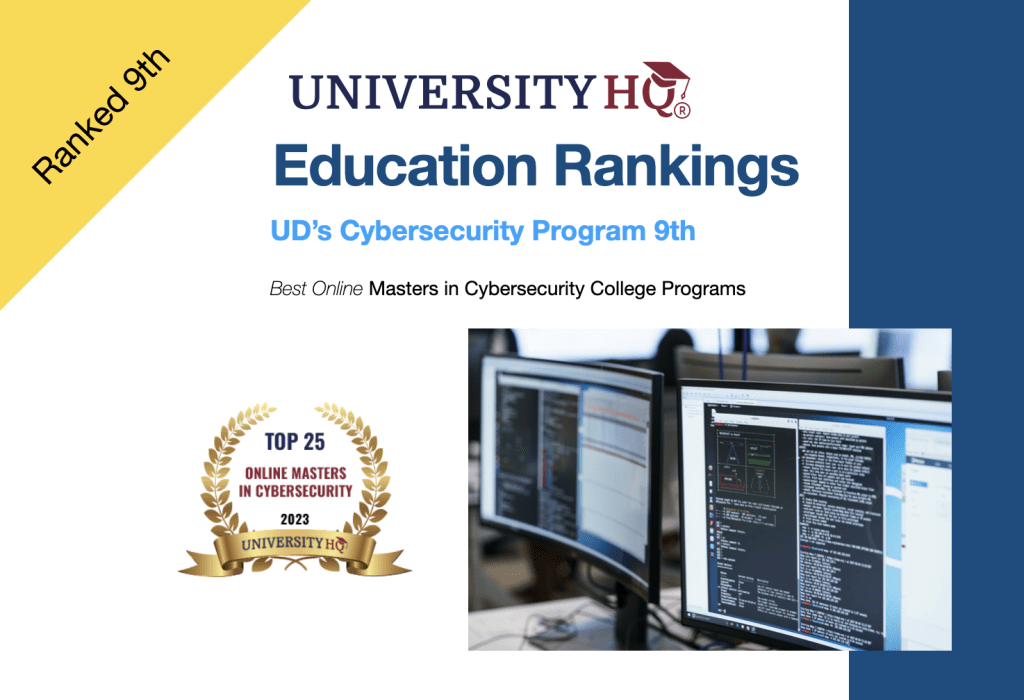
Article by Maddy Lauria Photo illustration by Joy Smoker June 28, 2022
Cybersecurity engineering undergraduate program coming to UD in Fall 2022
With digital devices infiltrating nearly every corner of our lives, from the way we communicate to how we bank to how we cast our ballots, making sure those systems are safe and secure has become more important than ever.
In recent years, Americans have witnessed first-hand what happens when safeguards on these digital devices fail. Just last year, hackers side-lined the nation’s largest fuel pipeline, bringing a vital supply chain to its knees and highlighting the real threat of cyberattacks.
Cybersecurity, once a niche focus for tech-focused minds, is now a critical part of our everyday lives. Earning cybersecurity certificates or studying the field as a minor will no longer cut it in today’s digital age.
To help fill that gap, the University of Delaware’s College of Engineering is among the leading academic institutions in the nation to offer a unique cybersecurity engineering degree starting in Fall 2022. The undergraduate degree will help train a much needed workforce that is in high demand now, and is expected to grow in the coming years.
“We are extremely excited to offer the new cybersecurity engineering degree, with a program that is designed to meet a major market and societal need, particularly in Delaware and the region in the financial and defense sectors,” said Jamie Phillips, professor and chair of the Department of Electrical and Computer Engineering where the new program will be housed.
A key strength of the program, Phillips said, is the combination of rigorous cybersecurity fundamentals along with the design and problem-solving skills that UD engineers are known for, thanks to the department’s design-infused curriculum.
“As a result, our graduates will not only have the important modern-day cyber skills, but also the expertise and mindset to analyze, design and build secure devices and systems,” he said.
In October 2021, the White House even emphasized the need for a “whole-of-nation effort to confront cyber threats.”
“Cyber threats can affect every American, every business regardless of size, and every community,” President Joe Biden, a UD alum, said in a statement issued by the White House. “The Federal government needs the partnership of every American and every American company in these efforts. We must lock our digital doors — by encrypting our data and using multi-factor authentication, for example — and we must build technology securely by design, enabling consumers to understand the risks in the technologies they buy. Because people — from those who build technology to those to deploy technology — are at the heart of our success.”
UD’s College of Engineering has anticipated this need for years and now is expanding its offerings with this specialized degree offering.
“We’re a leader in the game,” said Kenneth Barner, Charles Black Evans Professor of Electrical Engineering who, along with Department of Electrical and Computer Engineering Assistant Professor Nektarios Tsoutsos, was a driving force behind the new degree program. While at least two dozen other institutions, such as Purdue University, the University of Texas at Austin and the U.S. Naval Academy, offer cybersecurity degrees, UD will be among the earliest in the nation to offer a cybersecurity engineering program.
“We’ve been doing this kind of work for a very long time, and we already have a huge portfolio of programs that add to our expertise in this area,” said Tsoutsos. “The cybersecurity threats are real and we need to defend. Before you could do that and get away with an electrical engineering degree and a minor in cybersecurity. Now that doesn’t work anymore, and we were among the first to notice that.”
Just as computer engineering was a new field in itself only a few decades ago, the new cybersecurity engineering degree will provide a strong foundation that bridges math and science with a design-infused curriculum. Within the Department of Electrical and Computer Engineering as well as the Department of Computer and Information Sciences, students already can pursue a minor in cybersecurity, a master’s in cybersecurity or pursue professional certifications. More competitive students can then use their skills to participate year-round in hackathons and cyber games, even at a national level, in large part thanks to the resources available at the on-campus Innovation Suite (iSuite).
“To have a dedicated degree makes the graduates much more well-prepared to hit the ground running with an employer or pursue graduate studies,” Barner said. “This is not just a fad. These are the kind of skills that employers want and need.”
The engineering focus of this unique program means students will not just tackle theoretical coding challenges. They’ll be gaining hands-on skills that are desperately needed in today’s industry.
“Cybersecurity is one of the hottest areas in science, technology, engineering and math,” said Tsoutsos. “It’s not going to die out, and there is a major shortage of skilled labor in this area.”
Tsoutsos said that the cybersecurity field is growing by 7% annually, offering relatively stable job security for anyone willing to tackle the problems of the digital age. The United States is a leader in the field, and future students will have an opportunity to be on the forefront of future innovations in cybersecurity.
“I believe that the new cybersecurity engineering program will be wildly successful in attracting a diverse student population, and will meet an ever growing demand for talented professionals in Delaware, the region and beyond,” said Phillips.
To learn more or to enroll in this new program, go to ece.udel.edu/academics/undergraduate/cybersecurity-engineering-major.

UD computer science major Lauren Baron is making her mark
If Lauren Baron is any representation of the up-and-coming generation of scientists and engineers, then our future is going to be filled with innovative solutions.
At just 21 years old, this University of Delaware undergraduate has already developed a program that combines art therapy, physical therapy and virtual reality — and hopefully a bit of fun — for stroke patients working through their upper limb mobility challenges.
“This was my first time working with virtual reality. It was all new to me,” said Baron, recalling her first year at UD’s College of Engineering. By the end of the summer, she conducted a preliminary study — another first for this honors student. It was also her first time working online, since the second half of Baron’s first year coincided with the lockdowns due to COVID-19 in 2020.

Lauren Baron
The New Jersey native is studying computer science in the Department of Computer and Information Sciences, where research opportunities — even in a remote learning environment due to the pandemic — have helped her to embrace the creative side of her scientific pursuits.
“I’ve always been interested in computers,” said Baron. “It’s like a lot of problem solving. It didn’t feel like work to me. It’s fun to solve this problem or make that computer do something cool.”
Her project at UD has shown how turning physical therapy sessions into virtual reality games, where patients can virtually draw while also exercising their limbs, can help patients better engage in treatment. It also keeps them entertained, so they don’t get bored during their exercises or don’t feel pain as acutely.
“She wrote her first manuscript in her third semester at UD and she continued her project even when the program was concluded,” said Roghayeh (Leila) Barmaki, an assistant professor and Baron’s mentor. “She is a model for undergraduate students conducting research.”
In the three years she’s been pursuing her undergraduate degree and working in Barmaki’s award-winning Human-Computer Interaction (HCI) Lab, Baron has already earned a status as a published researcher, including as the first author on a peer-reviewed study on her VR therapy game published in the Association for Computing Machinery Proceedings.
Her UD department has recognized her as the Outstanding Sophomore Student with the Paul D. Amer Meritorious Award in 2021, as well as Outstanding Senior Student in 2022. She’s earned honorable mention from the Computing Research Association as an outstanding undergraduate researcher, as well.
“She’s definitely one of the rockstars,” said Austin Cory Bart, an assistant professor in the Department of Computer Sciences and Information.
Bart recalled when he first met Baron during her freshman year, and he can still remember her final project, a game she created called “Leaps and Bounds.” It wasn’t so different from Frogger, for those who remember the ‘80s arcade game in which a frog dodged traffic on a busy highway to get home. But the creative touches in the game’s appearance, and the fact that the program’s design was essentially coded from scratch by Baron, left an impression, Bart said.
“And she did it on her own,” he said. By her junior year, Baron was helping Bart as a teaching assistant. Not only was she helping in a challenging software engineering course, but she was also helping Bart learn how to teach the class with brand-new elements, showcasing Baron’s leadership skills on top of her technical prowess.
“It did not take her long at all to get up to speed,” Bart said. “It’s not just about knowing the material. It’s also about being there, convincing students they can ask you questions, showing a certain amount of authority and compassion at the same time.”
In addition to the strenuous studies of being a member of UD’s Honors College, Baron also is pursuing a minor in cyber security during her studies at the College of Engineering and has made the dean’s list every year. She said she’s specifically interested in keeping technology safer from hackers.
She said it was a friend during her freshman year who pointed her to research opportunities through the Delaware INBRE Summer Scholars Program, which ultimately led her to Barmaki and an introduction to biomedical-based approaches and virtual reality. Baron will continue fine-tuning the therapy-focused game as she prepares her senior thesis in the HCI lab.
Growing up in a close-knit Filipino family with a respiratory therapist for a mom, an anesthesiologist for an uncle and a physical therapist for an aunt, Baron said she thought she’d end up in the medical field, too.
But in high school, she had found an affinity for computer science, drawn by the creativity she found in digital problem solving. She also wanted to stay close to her family and UD seemed like the perfect fit, she said.
“I’m really happy with it. I love it,” she said. “There’s a big sense of community in the College of Engineering, and I’ve especially had a good experience in the computer science program. The teachers are really supportive of their students.”
She noted that the department specifically supports aspiring female scientists by providing scholarships and supporting their attendance at the annual Grace Hopper Celebration of Women in Computing, one of the leading conferences in the field.
During the summer in 2021 and 2022, Baron has been a software engineering intern at JP Morgan Chase. The summer after her freshman year (2020), she interned at the HCI Lab as a summer scholar and through UD’s Office of Economic Innovation and Partnerships’ “Spin In” program as a backend web development intern working on a “Manure Market” project that aimed to create a website connecting Delmarva poultry producers and those selling litter from poultry operations with buyers and brokers, ultimately to address the excess nutrients, such as phosphorus, in the region. She has also participated in UD coding team competitions and regional Hackathons, and since her freshman year has participated in the University’s Filipino Student Association, the Women’s Chapter of the Association for Computing Machinery, and CS+Social Good, an organization that connects community organizations with technical solutions from students, where she helps lead the effort’s public relations.
It’s not all about computers for this scientist from south Jersey, though. Baron is a former volleyball player who loves her technical work and studies but also enjoys traveling, spending time with friends, painting and baking.
This stellar student expects to graduate in fall 2022 – a semester early. After that, she plans to pursue a career in industry, possibly in the technology sector.
“She’s like a magnet,” Barmaki said, noting that she not only has a well-rounded extracurricular agenda, but that she was known to motivate others to join Barmaki’s group. “She’s trustworthy, hardworking and focused — and she also follows her dreams and passions. She knows what she’s looking for.”


 We’re not surprised that our online master’s program was ranked 9th!
We’re not surprised that our online master’s program was ranked 9th!



